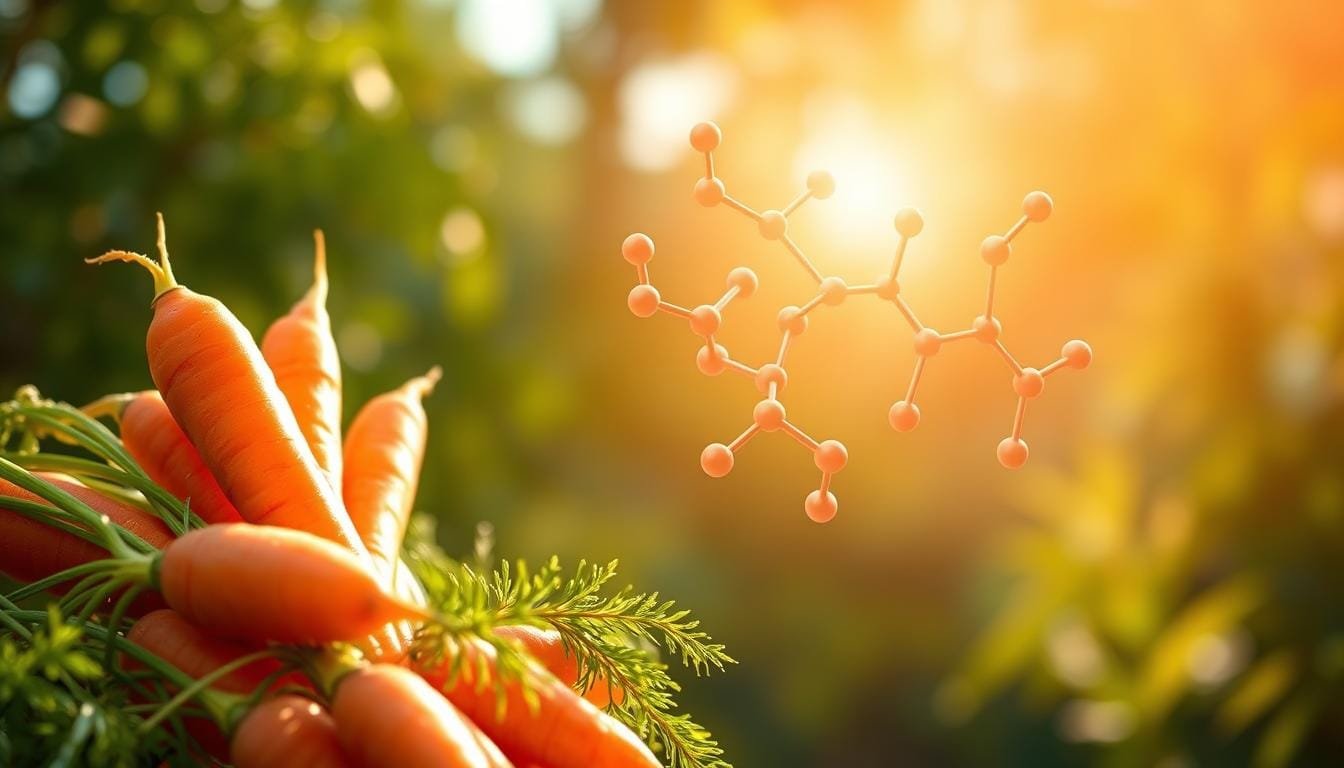Currently Empty: RM0.00
Did you know that over 250 million people worldwide suffer from vitamin A deficiency? This essential nutrient plays a key role in vision, immunity, and skin health. Fortunately, a natural solution exists—beta-carotene, a powerful pigment found in colorful fruits and vegetables.
Wellness Concept, a trusted health provider in Malaysia, offers high-quality supplements to help bridge nutritional gaps. Their products ensure balanced vitamin A levels, supporting overall wellness without synthetic additives.
This article explores the benefits of beta-carotene, top food sources, and practical tips for incorporating it into your diet. Whether you’re looking to improve eye health or strengthen immunity, these insights will guide you toward better choices.
For personalized advice, contact Wellness Concept at +60123822655 during business hours (9 AM–6 PM, Monday–Saturday).
Key Takeaways
- Beta-carotene converts to vitamin A, vital for vision and immunity.
- Colorful fruits and vegetables are natural sources of this nutrient.
- Wellness Concept provides safe, effective supplements in Malaysia.
- Balanced vitamin A levels support skin and overall health.
- Consult experts for tailored health solutions.
Introduction to Beta-Carotene Vitamin
Nature’s clever trick: a pigment that turns into essential nutrients when needed. Carotene, named after carrots (carota in Latin), was first isolated in 1831 from vibrant orange roots. Its chemical structure (C40H56) holds the key to safe, adaptable nourishment.
Unlike preformed vitamin A, which can pose a risk in excess, carotene converts only as the body requires it. This prevents toxicity while supporting vision, skin repair, and immunity. Think of it as a smart nutrient—always in balance.
Its antioxidant power fights free radicals, protecting cells from damage. In Malaysia, staples like sweet potatoes and kangkung (water spinach) make it easy to enjoy carotene-rich meals daily.
- Safe conversion: The body processes carotene into active vitamin A gradually.
- Local abundance: Malaysian diets naturally include carotene-packed produce.
- Antioxidant boost: Neutralizes harmful molecules linked to aging.
For those needing extra support, high-quality supplements offer a convenient option. Whether through food or trusted products, carotene delivers vitality without the guesswork.
The Remarkable Benefits of Beta-Carotene Vitamin
Oxidative stress silently damages cells, but nature offers a powerful countermeasure. Found in bright-colored produce, this nutrient combats free radicals—unstable molecules linked to aging and chronic diseases. Research highlights its role in protecting everything from brain health to lung function.

Antioxidant Powerhouse
A 2007 Harvard study found long-term supplementation slowed cognitive decline in men by 40%. The BMJ also reported higher blood levels of this nutrient reduced lung function decline. How? By neutralizing free radicals that cause oxidative stress.
In Malaysia, urban pollution and UV exposure increase free radical production. Antioxidants act like shields, preventing cellular damage tied to cancer and heart disease.
Supports Eye and Skin Health
This nutrient helps prevent *age-related macular degeneration* (AMD), a leading cause of vision loss. It also filters UV rays, reducing sun-induced skin damage. Locally available foods like mangoes and pumpkins provide these protective benefits.
Boosts Immune Function
White blood cells rely on antioxidants to fight infections. A strong immune system is vital in tropical climates where pathogens thrive. Regular intake may lower risks of common illnesses.
| Food | Antioxidant Level (per 100g) | Malaysian Availability |
|---|---|---|
| Sweet Potato | High | Year-round |
| Spinach | Moderate-High | Widely grown |
| Papaya | Moderate | Seasonal |
Top Food Sources of Beta-Carotene
Eating the rainbow isn’t just for kids—it’s a smart strategy for better nutrition. Vibrant fruits vegetables like sweet potatoes and spinach are packed with this essential nutrient. Locally grown options make it easy to enrich your diet with foods rich in antioxidants.
Colorful Picks for Every Meal
Malaysian markets offer a bounty of carotene-packed produce. Sweet potatoes lead with 9,406 mcg per 100g, followed by carrots (8,279 mcg) and spinach (6,103 mcg). Seasonal favorites like papaya and mango add sweetness, while pumpkin and kangkung (water spinach) are versatile staples.
| Food | Beta-Carotene (mcg/100g) | Best Preparation |
|---|---|---|
| Sweet Potato | 9,406 | Roasted or steamed |
| Carrots | 8,279 | Sautéed with oil |
| Spinach | 6,103 | Lightly stir-fried |
Smart Cooking Tips
Heat boosts nutrient absorption—cooked carrots deliver 30% more benefits than raw. Pair them with healthy fats like coconut or olive oil for maximum uptake. Try stir-frying spinach with garlic or blending mango into smoothies.
Avoid overcooking to preserve antioxidants. For inspiration, explore carrot juice benefits and other local recipes. Small tweaks can turn everyday meals into nutrient powerhouses.
Potential Risks and Considerations
Not everyone processes this antioxidant the same way—here’s what to watch for. While it supports overall health, certain conditions and habits demand caution. Understanding these nuances helps maximize benefits safely.

Special Caution for Smokers
NIH studies reveal that people smoke and take high-dose supplements (20–30mg) face an 18–28% higher risk lung cancer. Food sources, however, remain safe and beneficial. Smokers should prioritize carrots, spinach, and sweet potatoes over pills.
Navigating Supplement Interactions
Mixing supplements with medications can trigger side effects. Cholesterol drugs (statins), weight-loss medications, and even mineral oil may reduce absorption or strain the liver. Always disclose supplements to your healthcare professional.
| Substance | Interaction Risk | Recommendation |
|---|---|---|
| Statins | Reduced efficacy | Space doses 4+ hours apart |
| Alcohol | Liver stress | Limit intake; monitor enzymes |
| Mineral Oil | Nutrient depletion | Avoid concurrent use |
Carotenodermia, a harmless orange skin tint, may occur with excessive intake. It resolves once consumption normalizes. For personalized guidance, Wellness Concept’s experts tailor advice to your health profile.
- Smokers: Avoid high-dose supplements; opt for whole foods.
- Medication users: Consult a healthcare professional before adding supplements.
- All users: Monitor for carotenodermia if consuming large amounts.
How to Incorporate Beta-Carotene into Your Daily Routine
Small daily choices can make a big difference in meeting your nutritional goals. A diet rich in colorful produce ensures your body needs are met without supplements. Here’s how to make it simple and sustainable.
Smart Dietary Recommendations
Adults require 700–900 mcg Retinol Activity Equivalents (RAE) per day. One medium carrot (~4,000 mcg) or ½ cup cooked spinach (~3,000 mcg) covers half this need. Try these easy additions:
- Breakfast: Blend mango or papaya into smoothies.
- Lunch: Add roasted sweet potatoes to salads.
- Dinner: Stir-fry kangkung with garlic and olive oil.
Pairing these foods with healthy fats boosts absorption. For example, drizzle coconut oil over pumpkin soup or toss carrots in sesame oil.
| Meal | Beta-Carotene Source | RAE Contribution |
|---|---|---|
| Morning Snack | 1 cup cantaloupe | 2,400 mcg |
| Lunch | ½ cup cooked kale | 4,500 mcg |
| Dinner | 1 medium baked sweet potato | 9,400 mcg |
When Supplements Make Sense
Supplements are only advised for deficiencies or specific conditions like malabsorption. A healthcare professional can diagnose shortages through blood tests. Consider supplements if:
- Your diet lacks varied fruits and vegetables.
- You have Crohn’s disease or celiac disease.
- You follow restrictive diets (e.g., vegan without fortified foods).
Local Malaysian brands often offer better value than imported options. Wellness Concept’s tailored plans ensure you get the right dosage without excess.
For personalized advice, consult a healthcare professional. They can help lower risk of imbalances while optimizing your nutrient intake.
Conclusion
For lasting vitality, nature’s vibrant foods hold the key. Prioritizing colorful produce like sweet potatoes and spinach supports vision, immunity, and overall health. Smokers should opt for whole foods to lower risk and avoid high-dose supplements.
A diet rich in antioxidants is simple with local favorites—think stir-fried kangkung or mango smoothies. For personalized guidance, Wellness Concept offers expert advice via WhatsApp (+60123822655). Their team is available weekdays (9:30 AM–6:30 PM) and weekends (10 AM–5 PM).
Start your journey to better health today!
FAQ
What foods are rich in beta-carotene?
Brightly colored fruits and vegetables like carrots, sweet potatoes, spinach, and mangoes are excellent sources. These foods help support overall health naturally.
Can beta-carotene supplements replace a healthy diet?
While supplements can help, whole foods provide additional nutrients and fiber. It’s best to get most of your intake from a balanced diet.
Are there risks for smokers taking beta-carotene?
Studies suggest high-dose supplements may increase lung cancer risk in smokers. Consulting a healthcare professional before use is recommended.
How does beta-carotene benefit the skin?
It acts as an antioxidant, protecting skin from sun damage and promoting a healthy glow. Eating foods like carrots and leafy greens helps maintain skin health.
What’s the best way to absorb beta-carotene from food?
Pairing it with healthy fats, like olive oil or avocado, improves absorption. Light cooking also makes it easier for the body to use.
Can beta-carotene improve eye health?
Yes, it supports vision by converting to vitamin A, which is essential for eye function. Foods like kale and butternut squash are great choices.
Who should consider beta-carotene supplements?
Those with dietary restrictions or deficiencies may benefit, but always check with a doctor first. Most people get enough from a varied diet.



